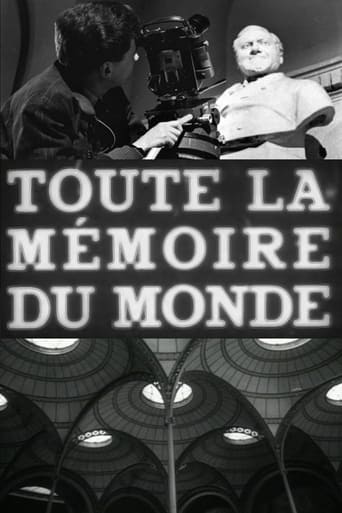Bloodwank
As an aspiring librarian this film holds natural interest to me. And it's fascinating in its perusal of the work of librarians, the conversion of books, manuscripts, letters et al from disparate beings into objects of the one great whole. The one great whole is the core of the exercise though, the film represents library not just as mind, not just one persons process of drawing in, of classifying and cataloguing knowledge, but that of the whole world. A collective mind then, but not a natural occurrence, an edifice constructed purposefully to forestall the overwhelming force of the great mass of knowledge out there. Camera angles show library workers both as ants and masters, atmospheric controls are likened to the control board of Nemo. In the Nemo reference there is both the notion of obscure mastery, and the literal meaning, nobody. So the library seeks to control and make impersonal the corpus of knowledge so that it may be best used, while in its construction and its workers (each representative of operation of the mind) perhaps controls, makes impersonal the mind itself, making it an idealisation of mind, clear and functional. In some ways it isn't much of a human affair in that there's no passage into the thoughts, minds of librarians themselves, what we are seeing is very much an intellectualised, a lofty and philosophical take. One could take from this that its thoughts are undermined, that what we are seeing is not real experience but one mans speculation, but I think the camera gives it more of a universal appeal. Mostly slow, exploratory, pausing sometimes at what is interesting, when browsing the library bowels it takes on the quality of a human visitor quietly browsing. And the intent score from Maurice Jarre gives it a sense of dynamic, of real human impression. And of course for people not versed in how libraries operate this is a first rate primer in the sort of things they do, it has not even dated much despite factors such as the growth in electronic content (though I'm a little dubious as to whether volumes were ever physically inoculated, I suspect this may just have been a handy metaphor though I'm not certain). Overall its a terrific work I think, considerable merit in its own right and presaging Resnais' later work in its use of physical world as headstate, illustration of mind, its twists and turns and shabby corners. Very much worth a look, 8/10
chaos-rampant
This one prefaces Resnais subsequent work, memory and what forms appear in it. The consistently brilliant touch of this is that he visualizes memory by means of cinema, a space which the camera can literally explore.Here he stumbles upon a fitting metaphor for the mind, the National Library of France. We see how knowledge is routinely amassed and categorized there, how people daily wade through so much information which then is merely stored away for future reference. What looks frightening to me is not that what is infinite and beyond words is believed that it can fit into shelves, but the megalomania behind the enterprise, the belief that among these shelves the secrets of the universe may be unlocked one day.But what is stored away there is merely thought or the objects of it. Our civilization destroyed by some imaginary catastrophe, how will an alien visiting the ruins of this library know how we experienced through our eyes a gust of wind or a sunset?To accommodate with the ever increasing influx of information, we're shown how the library burrows further underground, digging deeper inside of us. Resnais explores this cavernous place with a camera that recalls the future endeavors of Sacha Vierny, and although a bit obvious in what is intended by it, as a prologue of what was then to come, it's a great watch.
benoitlelievre
Alain Resnais is a damn wizard! You have to see Toute la mémoire du monde, than Nuits et Brouillards, than Hiroshima mon amour to understand the power of the message being sent there.With Toute la mémoire du monde, Resnais is setting the basis of his cinematographic project about places of memory. Within 20 minutes, Resnais is surgically, methodically analyzing the national library of France. With an hyperactive camera, he's sneaking, he's smelling, he's feeling this huge building. Very fast paced and organized movie that sets up more than ever, the cut between him and the other directors of the french new wave. In my humble cinephile opinion, Resnais is in a league of his own.


